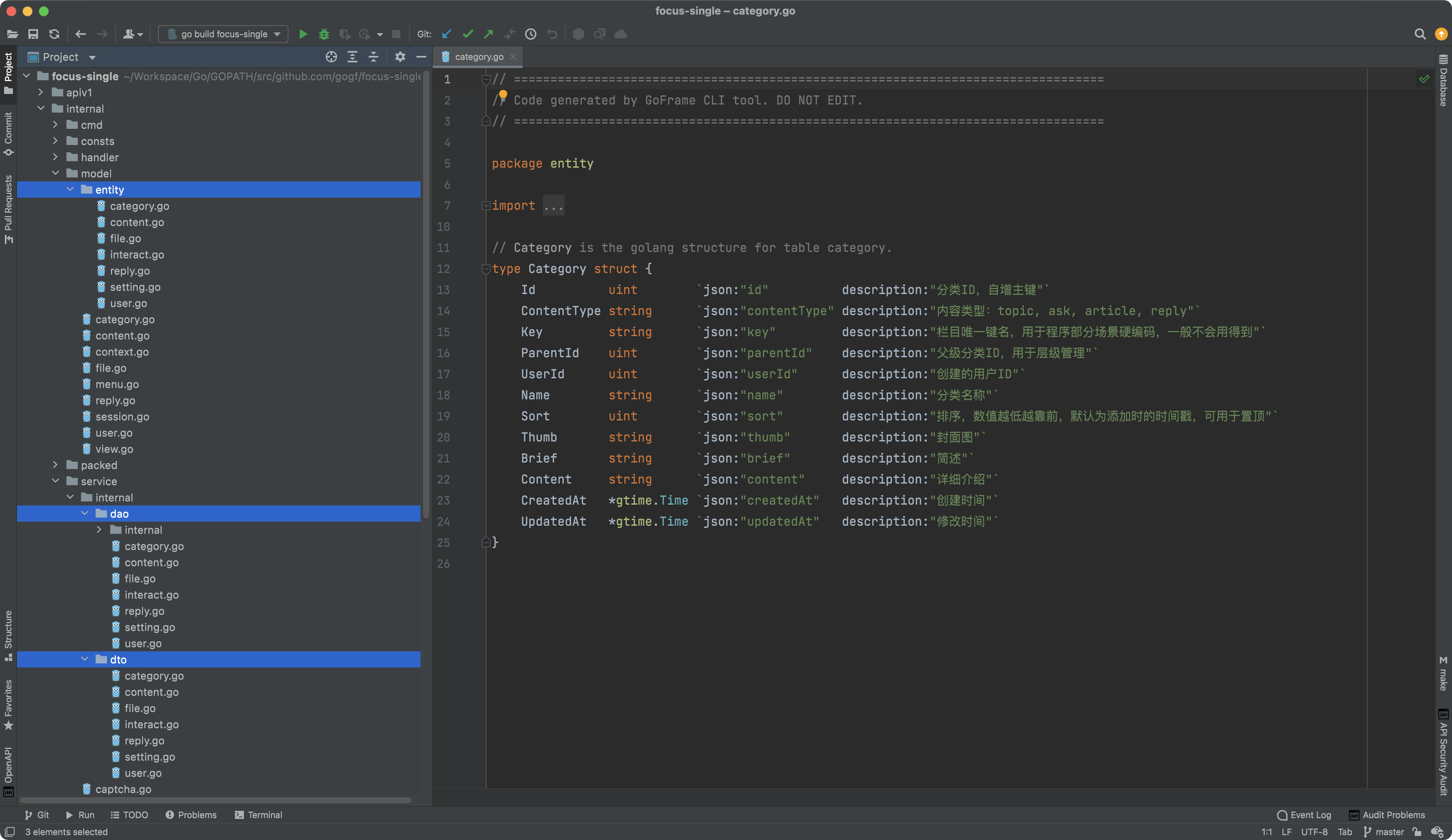GoFrame 开发工具-数据规范
dao命令是CLI中最频繁使用、也是框架设计的工程规范能否准确落地的关键命令。该命令用于生成dao数据访问对象、do数据转化模型及entity实例数据模型Go代码文件。由于该命令的参数、选项较多,我们推荐使用配置文件来管理生成规则。
一、使用方式
大部分场景下,进入项目根目录执行 gf gen dao 即可。以下为命令行帮助信息。
$ gf gen dao -h
USAGE
gf gen dao [OPTION]
OPTION
-p, --path directory path for generated files
-l, --link database configuration, the same as the ORM configuration of GoFrame
-t, --tables generate models only for given tables, multiple table names separated with ','
-e, --tablesEx generate models excluding given tables, multiple table names separated with ','
-g, --group specifying the configuration group name of database for generated ORM instance,
it's not necessary and the default value is "default"
-f, --prefix add prefix for all table of specified link/database tables
-r, --removePrefix remove specified prefix of the table, multiple prefix separated with ','
-j, --jsonCase generated json tag case for model struct, cases are as follows:
| Case | Example |
|---------------- |--------------------|
| Camel | AnyKindOfString |
| CamelLower | anyKindOfString | default
| Snake | any_kind_of_string |
| SnakeScreaming | ANY_KIND_OF_STRING |
| SnakeFirstUpper | rgb_code_md5 |
| Kebab | any-kind-of-string |
| KebabScreaming | ANY-KIND-OF-STRING |
-i, --importPrefix custom import prefix for generated go files
-s, --stdTime use time.Time from stdlib instead of gtime.Time for generated time/date fields of tables
-n, --gJsonSupport use gJsonSupport to use *gjson.Json instead of string for generated json fields of tables
-o, --overwriteDao overwrite all dao files both inside/outside internal folder
-d, --descriptionTag add comment to description tag for each field
-k, --noJsonTag commandGenDaoBriefNoJsonTag
-m, --noModelComment no model comment will be added for each field
-h, --help more information about this command
EXAMPLE
gf gen dao
gf gen dao -l "mysql:root:12345678@tcp(127.0.0.1:3306)/test"
gf gen dao -p ./model -c config.yaml -g user-center -t user,user_detail,user_login
gf gen dao -r user_
CONFIGURATION SUPPORT
Options are also supported by configuration file.
It's suggested using configuration file instead of command line arguments making producing.
The configuration node name is "gfcli.gen.dao", which also supports multiple databases, for example(config.yaml):
gfcli:
gen:
dao:
- link: "mysql:root:12345678@tcp(127.0.0.1:3306)/test"
tables: "order,products"
jsonCase: "CamelLower"
- link: "mysql:root:12345678@tcp(127.0.0.1:3306)/primary"
path: "./my-app"
prefix: "primary_"
tables: "user, userDetail"二、配置示例
gfcli:
gen:
dao:
- link: "mysql:root:12345678@tcp(127.0.0.1:3306)/test"
tables: "order,products"
jsonCase: "CamelLower"
- link: "mysql:root:12345678@tcp(127.0.0.1:3306)/primary"
path: "./my-app"
prefix: "primary_"
tables: "user, userDetail"三、参数说明
| 名称 | 必须 | 默认值 | 含义 | 示例 |
|---|---|---|---|---|
gfcli.gen.dao |
是 | dao代码生成配置项,可以有多个配置项构成数组,支持多个数据库生成。不同的数据库可以设置不同的生成规则,例如可以生成到不同的位置或者文件。 |
- | |
link |
是 | 分为两部分,第一部分表示你连接的数据库类型mysql, postgresql等, 第二部分就是连接数据库的dsn信息。 |
- | |
path |
internal |
生成dao和model文件的存储目录地址。 |
./app |
|
group |
default |
在数据库配置中的数据库分组名称。只能配置一个名称。数据库在配置文件中的分组名称往往确定之后便不再修改。 | defalut
order
user |
|
prefix |
生成数据库对象及文件的前缀,以便区分不同数据库或者不同数据库中的相同表名,防止数据表同名覆盖。 | order_
user_ |
||
removePrefix |
删除数据表的指定前缀名称。多个前缀以,号分隔。 |
gf_ |
||
tables |
指定当前数据库中需要执行代码生成的数据表。如果为空,表示数据库的所有表都会生成。 | user, user_detail |
||
tablesEx |
Tables Excluding,指定当前数据库中需要排除代码生成的数据表。 |
product, order |
||
jsonCase |
CamelLower |
指定model中生成的数据实体对象中json标签名称规则,参数不区分大小写。参数可选为:Camel、CamelLower、Snake、SnakeScreaming、SnakeFirstUpper、Kebab、KebabScreaming。 |
Snake |
|
stdTime |
false |
当数据表字段类型为时间类型时,代码生成的属性类型使用标准库的time.Time而不是框架的*gtime.Time类型。 |
true |
|
gJsonSupport |
false |
当数据表字段类型为JSON类型时,代码生成的属性类型使用*gjson.Json类型。 |
true |
|
overwriteDao |
false |
每次生成dao代码时是否重新生成覆盖dao/internal目录外层的文件。注意dao/internal目录外层的文件可能由开发者自定义扩展了功能,覆盖可能会产生风险。 |
true |
|
importPrefix |
通过go.mod自动检测 |
用于指定生成Go文件的import路径前缀。特别是针对于不是在项目根目录下使用gen dao命令,或者想要将代码文件生成到自定义的其他目录,这个时候配置该参数十分必要。 |
github.com/gogf/gf |
|
descriptionTag |
false |
用于指定是否为数据模型结构体属性增加desription的标签,内容为对应的数据表字段注释。 |
true |
|
noModelComment |
false |
用于指定是否关闭数据模型结构体属性的注释自动生成,内容为数据表对应字段的注释。 | true |
四、使用示例
仓库地址:https://github.com/gogf/focus-single

1、以下3个目录的文件由dao命令生成:
| 路径 | 说明 | 详细介绍 |
/internal/model/entity |
数据模型 | 数据模型由工具维护,用户不能修改。
工具每次生成代码文件将会覆盖该目录。 |
/internal/service/internal/do |
数据转换模型 | 数据转换模型用于业务模型到数据模型的转换,由工具维护,用户不能修改。
工具每次生成代码文件将会覆盖该目录。 |
/internal/service/internal/dao |
数据操作对象 | 通过对象方式访问底层数据源,底层基于ORM组件实现。往往需要结合entity和do通用使用。该目录下的文件开发者可扩展修改,但是往往没这种必要。 |
2、model中的模型分为两类:数据模型和业务模型。
数据模型:通过CLI工具自动生成 model/entity 目录文件,数据库的数据表都会生成到该目录下,这个目录下的文件对应的模型为数据模型。数据模型即与数据表一一对应的数据结构,开发者往往不需要去修改并且也不应该去修改,数据模型只有在数据表结构变更时通过CLI工具自动更新。数据模型由CLI工具生成及统一维护。
业务模型:业务模型即是与业务相关的数据结构,按需定义,例如service的输入输出数据结构定义、内部的一些数据结构定义等。业务模型由开发者根据业务需要自行定义维护,定义到model目录下。
3、dao中的文件按照数据表名称进行命名,一个数据表一个文件及其一个对应的DAO对象。操作数据表即是通过DAO对象以及相关操作方法实现。dao操作采用规范化设计,必须传递ctx参数,并在生成的代码中必须通过Ctx或者Transaction方法创建对象来链式操作数据表。

4、同时,dao采用了工程化规范设计。可以看到,dao/do是service层内部模块,也就是说,只有service层才能访问dao数据操作对象并与底层数据库交互。这样通过工具落地规范的方式避免了项目中随处调用dao操作数据库的情况,规范了请求调用链。

